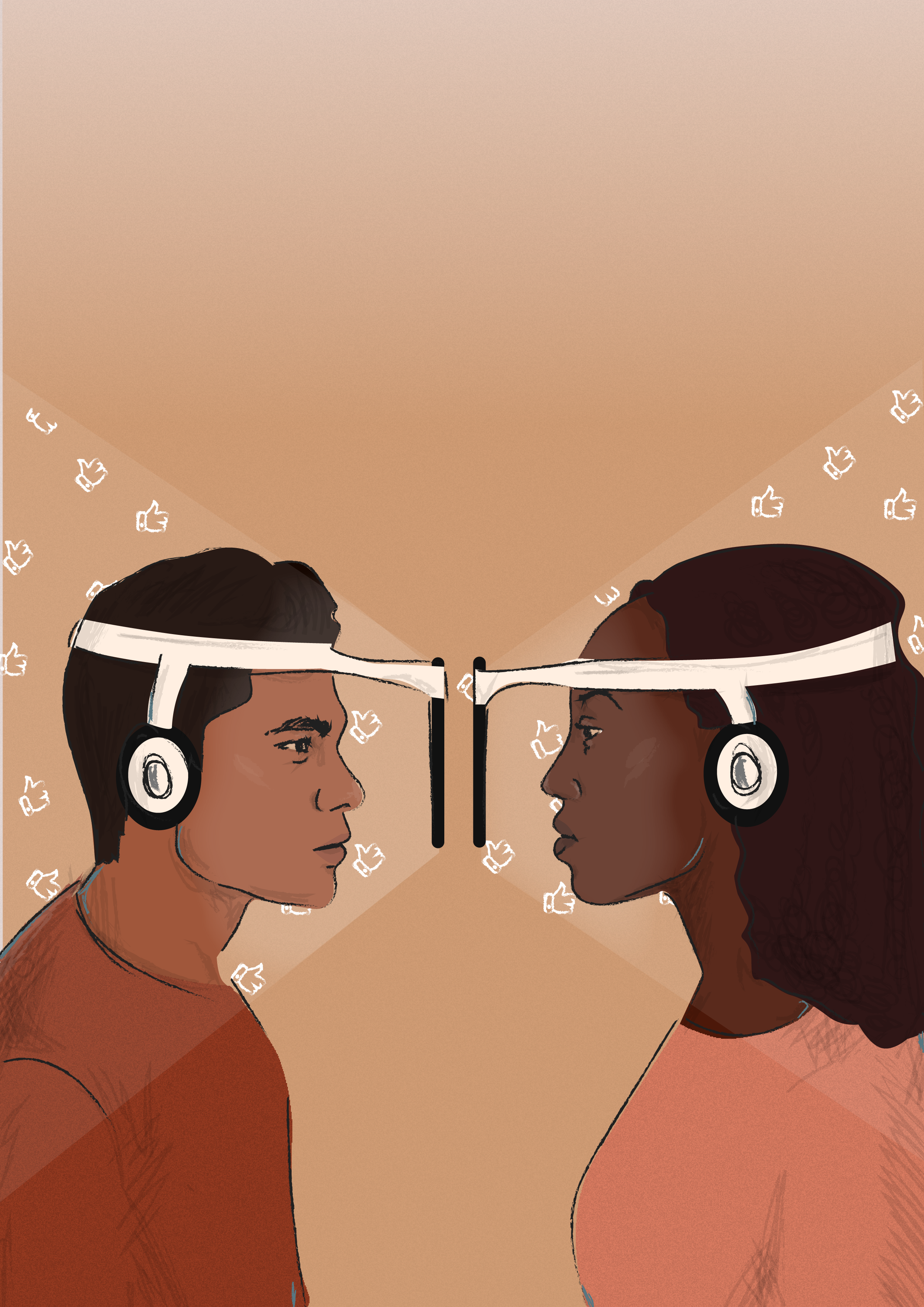[Words by Luke Kell (he/him)]
[Art by Ella Ottersbach-Edwards]
Content warning: discussion of mental illness
Facebook, Instagram, Snapchat, Twitter, if you grew up in the 21st century, then you’re no stranger to the media moguls of the technological age. Yet is the integration of social media into our daily lives creeping us closer to a ‘big brother’ type society, one where someone is watching your every move?
Whilst the image of men in black suits with tinted sunglasses might seem far-fetched, it’s not so unrealistic in the digital age. Social media has become incorporated within daily life as an almost compulsory feature of modern society. Indeed, our favourite platforms allow us to connect with people both in our inner circles and from across the globe, but they have also evolved in ways nobody had expected. Now, social media presents a myriad of capabilities; hosting games, uploading, and streaming media. They are constantly evolving to include new features intended to captivate our attention. Obviously, many of these features are an incredible way to spend an otherwise soul-destroying journey on public transport, whether you’re scrolling through cat videos, or rating your friend’s selection of fire outfits. Yet this can prove to be a problem if you find yourself hitting that like button for hours on end when there are better, more productive activities to be doing.
If you’ve seen the docudrama film, Social Dilemma, you’ll know about some of the techniques companies use to keep us glued to our screens. For example, have you ever felt the urge to look at your phone after getting a notification that your friend has tagged you in another cute puppy-pic? Similarly, have you ever felt that thrill when the three dots on messenger let you know your crush is replying to your ever-so-not-slightly risky text? Or even when that channel you watched once seems to keep popping up on your feed? All of these are examples of just some of the intentional decisions that companies have made to ensure their platforms keep you up long past bedtime. In the case of the documentary, Facebook: the world’s most used social media platform, agreed with the issues presented but was quick to deny accusations of blame. The platform claimed the documentary was ‘sensationalist’ and ‘scapegoated’ social media providers with issues coming from society as a whole.
However, regardless of who is to blame, it is easy to spot these addictive features across the various platforms we know and love. With the potential profit of advertising revenue, it’s unsurprising that companies use content such as fake-news and click-bait to target the unsuspecting socialite. According to a report by the Royal Society for Public Health, it is estimated that as many as 5% of young people are addicted to social media. Research has attributed a large portion of social media overuse to the ‘fear of missing out’. The feeling that others might be having an awesome time without us leads to compulsively checking our phones, eventually forming a habit over time. However, whilst most of us, especially myself, are probably guilty of checking our phones at the dinner table every so often, it’s hard to imagine ourselves as addicted.
Yet could society operate effectively without access to social media? The answer most likely differs from person to person. However, research has suggested we would be mentally healthier for it. As it stands in 2020, some 3.6 billion people, and 91% of 16-24-year olds, use social media across the globe, having risen from just 3.5 million in 1997. It comes as no surprise to hear that in the past twenty-five years the Royal Society for Public Health found that anxiety and depression in the 16-24 age group have also increased by 70%. With such a high engagement of this age group with social media, it’s easy to see a reasonable correlation.
Now, obviously, no-one is saying you should rush to the nearest lake and sacrifice your electronics to avoid some matrix/terminator-esque technology takeover. Social media isn’t all bad; there are, unsurprisingly, incredible benefits to communication, and inclusivity that social media affords. Just imagining a Coronavirus world with no internet is enough to send shivers down anyone’s spine. Yet maybe next time you find yourself up at 3 am scrolling the endless reel of Instagram you’ll consider whether you are the one making the decision, or if something, somewhere, is making that subconscious decision to watch just one more video, or send that last text, a little bit easier for you to make.

